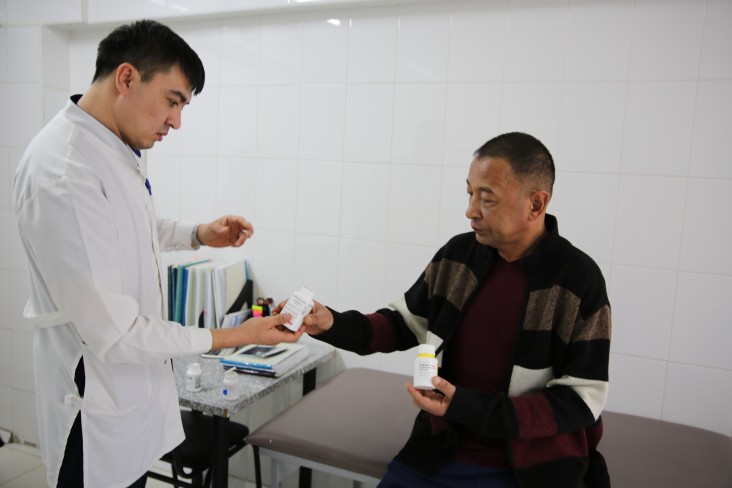Speeches Shim

Fighting Drug-Resistant Tuberculosis in Kazakhstan
Ruslan Khozhanberdiyev, a long-haul driver, enjoys moving cargo between Almaty, the largest city in Kazakhstan, and Khorgos, a main trade hub on the border with China. He finds the open road calming and likes taking in the scenery. However, his career was cut short when he fell ill with tuberculosis (TB).
In early 2019, Ruslan couldn’t shake his cough. He thought it was his smoking that made it worse, so he switched to lighter cigarettes. But with every passing week, his cough worsened and he started to lose weight. He finally decided to visit a medical clinic.
After diagnostic tests and an X-ray of his chest, Ruslan learned he had TB. He was immediately admitted to the National Tuberculosis Hospital in Almaty run by the Kazakhstan Government’s National Tuberculosis Program.
Fortunately for Ruslan, the Government of Kazakhstan has embraced internationally recognized diagnostic procedures and treatment protocols. Its high-quality laboratories are capable of testing for different types of TB, ensuring an effective treatment regimen and reducing the chances of patients transmitting TB to others.
Through rapid testing using GeneXpert technology on a machine donated by USAID, Ruslan was diagnosed with multidrug-resistant tuberculosis (MDR-TB), a form of TB infection caused by bacteria resistant to at least two first-line anti-TB medications. Ruslan was also tested for extensively drug-resistant TB (XDR-TB), which is even more difficult to treat, but the results came back negative.
For nearly 20 years, USAID has partnered with the Government of Kazakhstan to strengthen the health system in the country. USAID has helped the Government of Kazakhstan to update its TB treatment protocols to be in line with World Health Organization recommendations, improve the quality of its laboratory testing, and save $4 million in 2019 by helping them find a cheaper provider of TB-related commodities in the Global Drug Facility.
In 2019, through the USAID Global Accelerator to End TB, USAID donated fifty GeneXpert diagnostic machines, helping scale up the rollout of the diagnostic technology across Kazakhstan. The machines cut the time it takes to diagnose MDR-TB down from six months to two hours, allowing treatment to begin much more quickly and preventing the further spread of MDR-TB.
“I’ve regained my strength, and I feel good,” Ruslan said. “I am very grateful to all the medical staff at the hospital, especially my doctor, Dr. Amanzhan Abubakirov. He treats us like family. The other patients and I try to stay disciplined and take our medications on time because of him.”
Since 2010, with support from USAID and the Global Fund, overall incidence of TB in Kazakhstan has been on the decline. The country has nearly halved the number of cases of infection in the last eight years.
However, incidence of MDR-TB and XDR-TB have been on the rise since 2003 in Kazakhstan. XDR-TB had a low survival rate until 2016, when USAID introduced the drugs bedaquiline and delamanid in Kazakhstan through the End TB project led by Partners in Health and USAID’s Challenge TB program.
“I remember back then, I had two female patients, a 16-year-old and a 32-year-old. Both had XDR-TB. Their condition was considered untreatable,” said Dr. Amanzhan Abubakirov, a TB specialist at the National Tuberculosis Hospital in Almaty. “Had the new drugs not been introduced here, they would have probably died. Every year since their recovery, they’ve been coming back to celebrate the new year with us at the hospital, thanking us for saving their lives.”
The Government of Kazakhstan continues to increase its investment in its fight against TB, with an average of 43 billion KZT (about $113 million) annually for the past three years.
Treating MDR-TB in Kazakhstan can cost up to $2,700 per person, which is prohibitively expensive in a country where the average monthly wage is around $500. Fortunately, Ruslan didn’t have to pay for his treatment, since the Government of Kazakhstan subsidizes these expenses at its public TB clinics.
Ruslan is now nearing the end of his treatment. He will soon go back to living with his family, his adult daughter and her two sons. “I lost my job because of TB,” he said. “But I’m glad that I feel well again and that I can go back to my family. I will find another job driving a truck.”
Thanks to the shared achievements by USAID and the Government of Kazakhstan, patients like Ruslan can be diagnosed, treated, and cured within months of contracting the deadly disease.
About the Author
Hazel Correa is the senior regional development outreach and communications coordinator at USAID’s Mission to Central Asia. She is a seasoned communications professional with nearly a decade of international experience in global and national roles. Follow her work @hazel_correa.

Comment
Make a general inquiry or suggest an improvement.